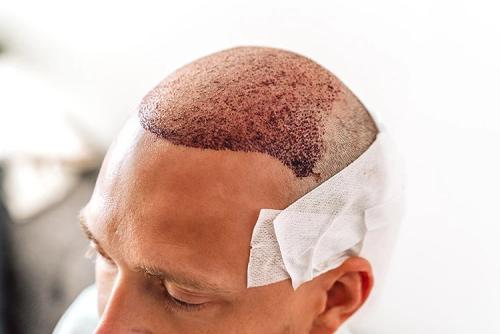Can You Have Multiple Hair Transplants?
If you're considering a hair transplant, one of the first questions that come to mind is, “Is hair transplant surgery expensive?” While the cost of a Hair Transplant(زراعة الشعر ) can vary depending on several factors, it is generally considered an investment in both your appearance and self-confidence. The price tag reflects the skill of the surgeon, the quality of the clinic, and the permanence of the results. In this article, we’ll explore what makes hair transplant surgery a high-value procedure and help you understand the cost breakdown and factors involved.The Importance of Hair Transplant Surgery:
Hair loss can be a frustrating and emotional experience for both men and women. Many people struggle with the visible signs of thinning or balding, which can affect self-esteem and personal confidence. Here’s why undergoing a hair transplant may be worth the investment:
Long-term solution: Unlike temporary solutions like wigs or hairpieces, a hair transplant offers a permanent fix for hair loss.
Restores confidence: Getting a full head of hair back can significantly improve your self-image and social interactions.
Minimal maintenance: Once your transplanted hair begins to grow, it requires little upkeep compared to other treatments.
Natural results: Modern hair transplant techniques, like FUE (Follicular Unit Extraction), provide natural-looking results that blend seamlessly with existing hair.
While the upfront cost may be higher, the lasting results can make a hair transplant worth every penny for those struggling with significant hair loss.
Risks and Benefits of Hair Transplant Surgery:
Like any medical procedure, hair transplants come with both benefits and risks. Understanding these will help you weigh the cost and make an informed decision.
Benefits:
Permanent results: Once the transplanted hair grows, it will remain for a lifetime.
Natural-looking outcome: Modern techniques ensure the transplanted hair looks indistinguishable from natural hair.
Customized procedure: Surgeons can tailor the procedure to suit your specific needs, such as restoring a receding hairline or adding volume to thinning areas.
Increased self-confidence: A successful hair transplant can improve how you feel about yourself, boosting your social and professional life.
Risks:
Initial discomfort and swelling: Swelling and bruising are common immediately after the procedure.
Possible scarring: While techniques like FUE minimize scarring, FUT (Follicular Unit Transplantation) may leave a linear scar.
Shock loss: Some people experience temporary hair shedding after the transplant before new hair begins to grow.
Cost considerations: The upfront cost is high, and multiple sessions may be required, depending on the severity of hair loss.
These risks should be discussed with your surgeon beforehand to ensure you're fully informed before undergoing the procedure.
:
Preparing Before the Procedure:
Proper preparation is key to ensuring the success of your hair transplant and minimizing potential complications. Here are some essential steps to take before your surgery:
Consultation: Schedule a consultation with a qualified hair transplant surgeon to assess your condition, hair loss pattern, and expectations.
Stop smoking and drinking: At least a week before the procedure, refrain from smoking and drinking alcohol, as they can interfere with healing and circulation.
Medications: Avoid blood-thinning medications like aspirin, and follow the surgeon’s instructions on which medications to stop before the surgery.
Time off work: Depending on the procedure and recovery time, plan to take a few days off work to ensure you’re able to rest and heal properly.
With careful planning, the procedure will be smoother, and recovery will be quicker, maximizing the investment you're making.
Aftercare and Recovery:
Aftercare is a crucial part of the hair transplant process to ensure the best results and avoid complications. Here's how to care for yourself after the procedure:
Avoid physical exertion: Refrain from intense physical activity for at least a week to avoid dislodging the grafts.
Protect your scalp: Use gentle shampoos and avoid scratching or touching the transplant area. Protect your scalp from the sun for a few weeks after surgery.
Follow-up visits: Regular follow-ups with your surgeon will help monitor the healing process and ensure the transplanted follicles are taking root.
Medication: Follow the prescribed regimen of medications to manage swelling and prevent infection.
Proper aftercare can significantly impact the final results, ensuring you get the most out of your investment in the procedure.
FAQs About Hair Transplant Surgery Costs:
Q: Are hair transplants covered by insurance?
A: Hair transplants are considered cosmetic procedures, so most insurance plans do not cover the cost. However, you may be able to find financing options or payment plans through the clinic.
Q: Is a hair transplant worth the cost?
A: For many people, the benefits far outweigh the cost. It’s a permanent solution that delivers natural, long-lasting results and can greatly improve self-esteem.
Q: Can I find cheaper options abroad?
A: Some countries, like Turkey and India, offer more affordable hair transplant options, often attracting medical tourists. However, make sure to do thorough research to ensure the quality and safety of the clinic.
Q: How long do the results of a hair transplant last?
A: The results of a hair transplant are permanent. However, you may continue to lose natural hair over time, but the transplanted hair will remain intact.
Conclusion:
Is hair transplant surgery expensive? Yes, but it’s an investment that can pay off in terms of both confidence and appearance. The high cost reflects the complexity, expertise required, and the long-lasting results you receive. While it may seem like a significant financial commitment upfront, the permanent nature of the procedure, along with the potential to restore your youthful appearance, makes it worthwhile for many individuals. By understanding the costs, risks, and aftercare, you can make an informed decision that aligns with your hair regrowth goals.
Hair transplant is a surgical procedure that moves hair follicles from one area to another, restorin

Share: